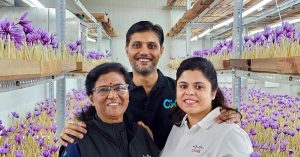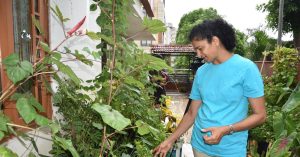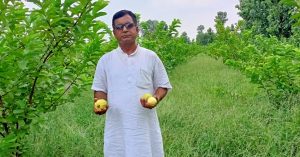Tea Stall Owner Takes Up Aloe Vera Farming & Makes 45 Products, Now Earns Lakhs
It all started when Ajay Swamy, a tea stall owner in Rajasthan, read about aloe vera in the newspaper. He started farming the plant and now earns lakhs by selling 45 products.
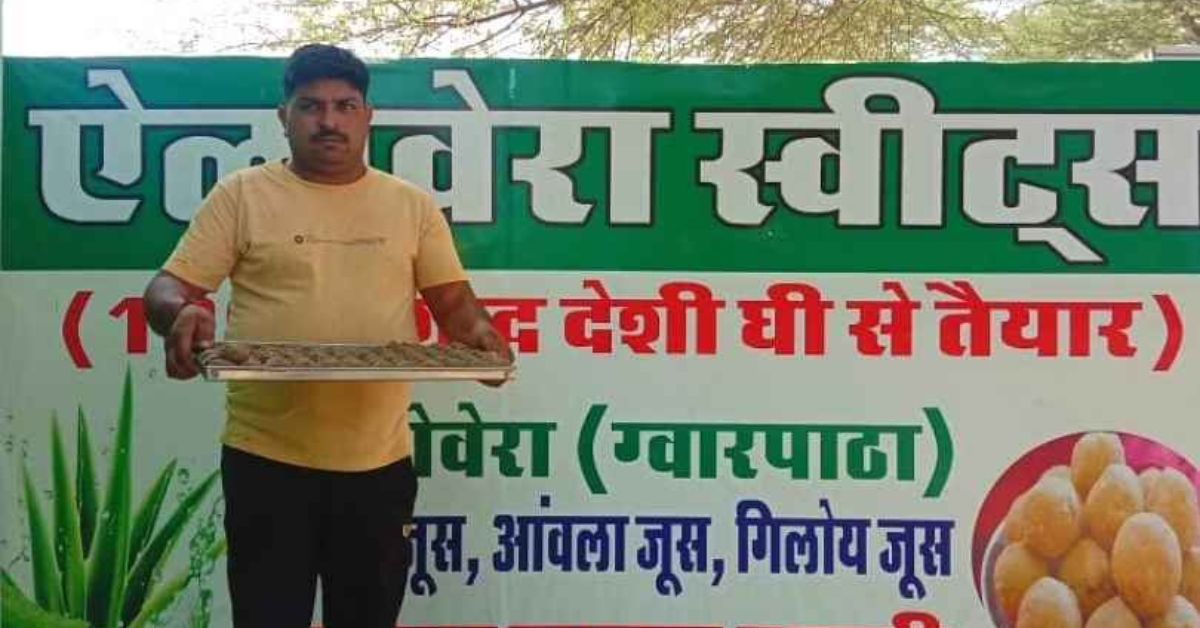
Ajay Swamy, a 31-year-old from Parlika village in Rajasthan’s Hanumangarh district, had no previous exposure to farming. All he had was two bighas of land that he had inherited from his father.
“One morning, I read about aloe vera in the newspaper and I thought it would be a good idea to cultivate it,” he recalls in a conversation with The Better India.
While aloe vera cultivation seemed like a viable option, Ajay did not have many resources to get started.
After completing his education until class 8, the young boy had to take the responsibility of running his home when his father passed away. In a bid to sustain his mother and himself, he started selling tea in 1999 at Rs 10 a cup.
“The business was very successful,” he says. But Ajay knew that he had to set his sights higher if he wanted a better life.
All along, his motive was simple — “What can I do to improve my financial situation at home?”
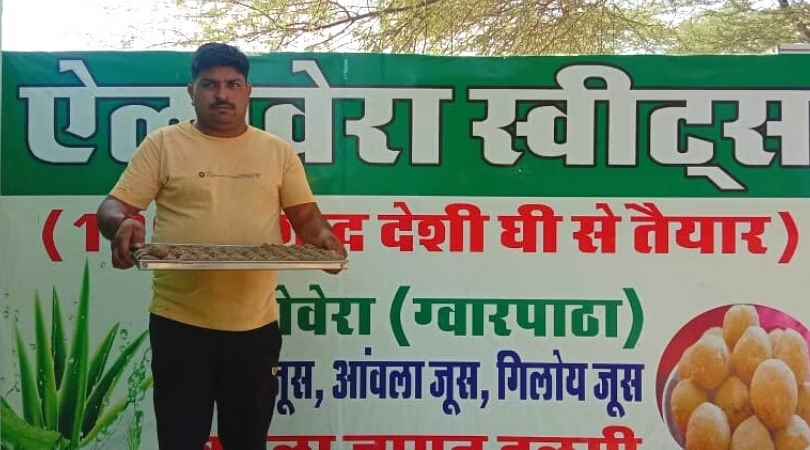
Setting up a business with an idea and determination
When Ajay saw the article in the newspaper about aloe vera, he thought ‘Why not use the two bighas of land and start growing the plant?’
While he says the money from the tea venture was great, he often thought he shouldn’t let such a good piece of land go to waste and make his late father proud by using the area for something worthwhile. Aloe vera seemed a novel thing to him.
In order to understand more about the plant, Ajay began reading and speaking to farmers in his village about aloe vera and how to grow it. Through these interactions, he learnt that aloe vera cultivation does not require a lot of water. This, he thought, was a great thing, as Rajasthan was a drought-prone area and cultivating a crop heavily dependent on water wouldn’t be a wise option.
But even though he had all the information he needed about how to grow the plant, Ajay was unsure of where to get the seeds or saplings to start.
“When I began asking around, people told me about a cemetery in a nearby village Churu, where there was an abundance of these plants,” says Ajay. “Following the death of someone in that village, someone had planted an aloe vera sapling there after the burial. Soon, more people began planting the sapling and aloe vera spread.”
The villagers were not happy with this.
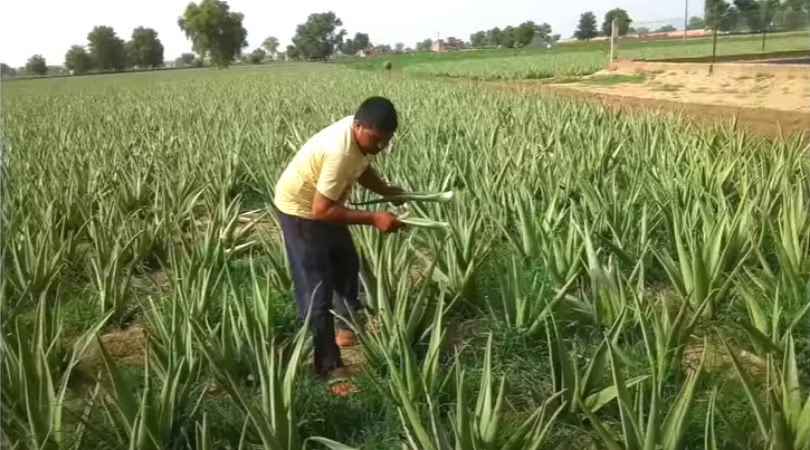
The plant had spread all across the graveyard and they wanted to uproot it and clear the space.
When Ajay got to know about this, he and a few more people from his village went to the cemetery with a tractor and trolley, and brought the aloe vera plant to his fields, where he replanted them.
He says he used good quality soil and fertiliser for the plants and read extensively on the internet about how aloe vera should be cared for. “I saw to it that the plants received enough sunlight and that the leaves were much above the ground,” he explains.
However, Ajay did not expect much from the cultivation, as it was his first time trying his hand at it. So alongside, he continued his tea shop venture.
To grow his repository of aloe vera, he used the money he had saved up from his tea business. A year and a half later, he was pleasantly surprised. Ajay had never expected that the crop would grow so well.
The long succulent leaves were a sight to behold.
With the success of his farming seeming close, he gave up his tea business in 2002. But Ajay says that even while he was planting and growing the aloe vera, he would always have one worry on his mind — where did people sell the plant?
Thus, when he had his harvest, he began scouting for buyers.
But the road to success was paved with multiple learnings and challenges.
“For two years, I never managed to find a customer to buy the aloe vera,” Ajay says, adding that he was perplexed as to what he should do with the field full of the plant. Then he noticed something.
“When I would go to the markets in Rajasthan to try and sell my aloe vera plant, I would see that bigger brands were buying aloe vera from farmers and then making by-products to make money,” he says. “So I bought a mixer and made a bottle of aloe vera juice on the farm itself.”
Before he knew it, he had sold 10 bottles of the aloe vera juice to people in his village. Soon, companies, too, showed interest in buying bottled aloe vera juice, and in time, the demand began growing.
“I shut the tea shop and focused on the aloe vera business,” says Ajay, adding that once he saw the success of the juices, he wanted to explore the gamut of products that he could come up with.
He started going to Krishi Vigyan Kendra, where he learnt about making different products like soap, creams, sweets, shampoos, conditioners, etc, and set up a processing unit on his land with the money he earned through the sale of the products.
He launched his brand Natural Health Care in 2012. Today, the venture sees a turnover of Rs 10 lakh a year, and has 45 products such as shampoos, conditioners, toothpastes, juices, sweets, etc, all made from aloe vera.
Ajay says these sell to 20 companies in and around Rajasthan. These companies include pharma brands, cosmetic companies, and ayurvedic health brands.
A business that puts health first
Looking back on his decision to start an aloe vera farm and then a full-blown business out of it, Ajay says he is glad he chose the right plant.
“The cost of aloe vera cultivation is low and one can get a good crop of it even in sandy soil. It doesn’t require a lot of water. One can sow 800 aloe vera plants in one bigha.”
He recounts how his fate changed because of the venture, and says he is happy people too are starting to understand the importance of aloe vera.
“Everyone knows that aloe vera is good for health and this is not a new thing. Our elders have been using it for years,” he says.
Ajay also reminisces about his own childhood days, when he would eat aloe vera laddus, and says that he experimented with them during the lockdown. “They turned out well and I am now making and selling two types of laddus,” he says.
In fact, these laddus are his top selling product, priced at Rs 350 per kg.
Ajay says the key for any farmer to move forward in the business is to keep innovating. “If you stay in one place and do not do anything new, then gradually you start falling behind.”
For farmers wanting to start aloe vera cultivation, Ajay advises taking special care of these plants during the winters, as this is a time when the climate may be adverse for the plant.
“One can expect to see the crop starting to get ready in as few as three to six months, while sometimes it can take 12 months.”
To order aloe vera products, you can contact Ajay on 9672682565.
Read the story in Hindi here.
This story made me
- 97
- 121
- 89
- 167
Tell Us More
We bring stories straight from the heart of India, to inspire millions and create a wave of impact. Our positive movement is growing bigger everyday, and we would love for you to join it.
Please contribute whatever you can, every little penny helps our team in bringing you more stories that support dreams and spread hope.






